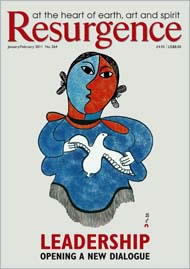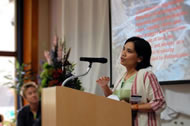From the Cordillera in the northern Philippines, Jennifer Awingan is a young Igorot leader who coordinates the Asia Pacific Indigenous Youth Network, which mobilises Indigenous youth for the promotion and protection of Indigenous peoples’ rights to self-governance, ancestral land, cultural integrity and socio-economic development that is, most importantly, consistent with their values.
Since 1990, Jennifer has helped to re-establish the Progressive Igorots for Social Action, and also works with the Cordillera People’s Alliance Youth Center. “I am trying to develop the kind of leadership I believe in,” she says.
Jennifer also played an active role in the organising and running of the Asia Pacific Climate Youth Camp in the Philippines last November: a lesser-known Indigenous antidote to the media-frenzied but apparently fruitless top-level Copenhagen talks of the previous year.
Jennifer talks about how tribes in her region are diverse in culture but united in their communities’ respect for the land and Nature. “How can you own land when it outlives you?” she asks, frustrated. “Land is life, not an asset.” She is referring to attempts at land grabbing and non-recognition of ancestral land, and the resulting violations of Indigenous peoples’ rights to ancestral domain. “There is a conflict of land systems, of land uses,” she says, pausing, and then concluding, “There is development aggression. Development is often imposed. Development is for a few, but they say it is for the majority – that is how they justify taking land to put a dam or a hydroelectric power station. But it is usually accompanied by militarisation. This is not what the majority want. This is not what we want.”
Jennifer is clearly passionate about the cause of her own people and other tribes around the world, and she remains hopeful. “At the moment, there are still resources, there is still Nature. That inspires me – I can hold on to this, and I can inspire others to do the same, to not give up. I can lead, as long as I know this.”
The number of indigenous people’s movements has grown across the globe, and representatives can now attend international forums, for example, with the United Nations and other global bodies. “This is a movement,” Jennifer says. “Leadership is not about just going to formal training and getting a degree, but it is also being part of a movement and a struggle – that is a school too. A movement teaches you to lead, and to be part of something. Leadership is participatory: it is about collective action – our network of Indigenous people is leading, because we need to. We are not waiting for anyone else.”
Jennifer goes on to talk about the importance of consulting their ancestors in this process. “We always ask our ancestors for advice. Leadership should keep hold of identity, but promote harmonious living between tribes. When there are boundaries, there is only chaos.”
When asked to sum up her vision for leadership in a couple of points, Jennifer elegantly points out that, as a leader, you need to move forwards, not backwards: “If you don’t go forward, then you will go out – you need to inspire and go to places where people have not gone before.” She also strongly believes that “leadership has to involve young people now; it is not good thinking they will want to lead in the future – you need to use their passion now; they can be the leaders of today”.
“A leader should be a dreamer,” Jennifer concludes. “Anything is possible!” With a vision like this, she leaves you with the feeling that might just be true.
Jennifer Awingan is a coordinator with the Asia-Pacific Indigenous Youth Network, which aims to promote and defend the rights of indigenous peoples in general, and the indigenous youth in particular.








